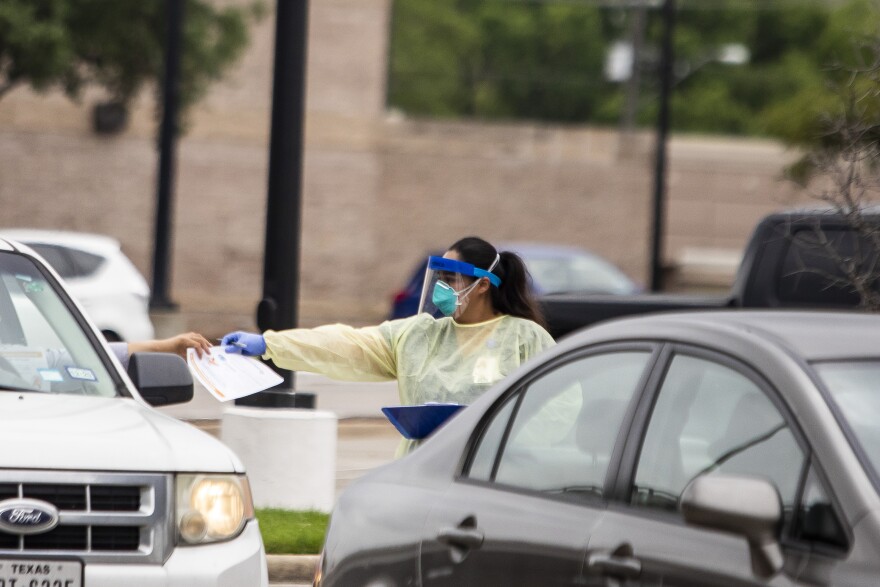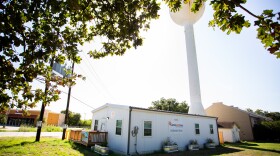Travis County commissioners voted Tuesday to approve Central Health’s next budget, which includes a $20 million increase in funding for health care services for low-income residents.
Central Health, Travis County’s health care district, connects uninsured and low-income residents with services. While it doesn’t directly operate health care facilities, it does provide them with money to serve these residents. Central Health says the demand for health care services for low-income residents already had been on the rise. The COVID-19 pandemic has only exacerbated the need.
“This [budget] is a commitment to the community and it’s fulfilling our missions of caring for those who need it most and improving the health of our community,” Central Health President and CEO Mike Geeslin told commissioners Tuesday.
The fiscal year 2021 budget is $367 million, 96% of which goes toward health care delivery – primary care, specialty care, behavioral health and more. CommUnityCare, a system of federally qualified health centers that Central Health funds, provides the bulk of the primary care services, through its 27 clinics.
The budget includes $9.5 million in funding for development of three new clinics in Eastern Travis County – in Hornsby Bend, Del Valle and Colony Park. Central Health has already bought land in Hornsby Bend and Del Valle for health centers there, and is currently working to buy land in Colony Park. Though funding is included for these projects in the FY 2021 budget, they likely won’t be completed in the next year. Central Health plans to spend another $18.5 million on the facilities in the following year, as well as use funds in its reserves and pursue debt financing.
Residents in Eastern Travis County have been calling for more health care facilities for years, and some have expressed frustration things aren’t moving quickly enough. Temporary facilities that operate a few days a week have been set up while plans for the long-term ones are underway.
“When you talk to the community itself, there is great unrest particularly as it relates to equity,” said Commissioner Jeff Travillion, who represents Northeast Travis County. “There is great unrest when you ask the question whether there is a safety net that exists in Southeast Travis County, in Northeast Travis County. … What really is important is to develop dedicated clinic space over time. We have not moved quickly enough on that.”
Another priority for the coming year is the COVID-19 response. Central Health plans to continue supporting CommUnityCare’s efforts – like testing, treatment and acquiring supplies – with funding from local, state and federal agencies.
Other areas receiving funding in the 2021 budget include technology and infrastructure enhancements and redevelopment of Central Health’s downtown property, the former University Medical Center Brackenridge.
Some members of the community have been calling on Central Health to spend less money on the downtown property and instead focus on bringing health care to areas that need it most. Susanna Woody, president of the Del Valle Community Coalition, asked the commissioners to ensure Central Health focuses its efforts on underserved communities like Del Valle.
“We ask that Central Health stop funding the downtown redevelopment project,” Woody, who called into Tuesday's Commissioners Court meeting, said. “It has nothing to do with health care services. It has to do with redeveloping downtown. We ask that you put more focus on the need in health care.”
By redeveloping and leasing parts of the downtown property, Central Health hopes to generate new sources of revenue to pay for health care services.
“With a more diverse mix of revenue sources, Central Health won’t have to rely solely on property taxes to fund health care for the growing number of people who need our support,” Central Health’s Board Chair Sherri Greenberg said in a statement after the board approved the budget Sept. 16.
Geeslin said Tuesday that Brackenridge is already yielding a lease income.
“Brackenridge needs to fund the Central Health mission, and that’s ultimately what we’re trying to do with that property,” he said. “It’s not to invest to be able to make money for administration costs; it’s to be able to put it back into health care.”
With unanimous approval from the Travis County Commissioners Court, Central Health’s property tax rate will increase to about 11 cents per $100 of valuation (up from around 10.6 cents). That will result in a bill of $392 per year for a home with the average taxable homestead value of $355,000, which is a $25 increase from this past year. A home with an average taxable homestead value of $200,000 will see a $14 increase.
Central Health’s tax rate makes up a small percentage – 4% – of Travis County residents’ tax bills; the Austin Independent School District and City of Austin make up the bulk. The new fiscal year begins Oct. 1.
Got a tip? Email Marisa Charpentier at mcharpentier@kut.org. Follow her on Twitter @marisacharp.
If you found the reporting above valuable, please consider making a donation to support it. Your gift pays for everything you find on KUT.org. Thanks for donating today.





